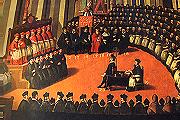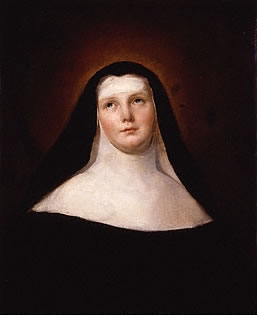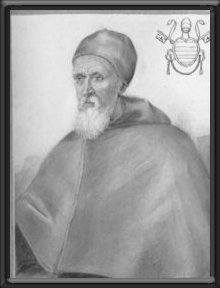Catholic Reform
WYH2003HS Spring 2003-- February 11
Links
For class, please browse through the documents of the Council of Trent (1545-1563). In particular, read the following which will form the basis of our seminar discussion: the Bull of Indiction; and the Second, Fourth, Sixth, Seventh, Thirteenth, Twenty-Second, and Twenty-Third Sessions; and the following decrees in the Twenty-Fifth Session: invocation of saints, and indulgences.
The Catechism for priests of the Council of Trent.
The Rules on Prohibited Books of the Council of Trent.

The Council of Trent, met in the cathedral of Trento, a city in northern Italy. (Trento was then part of the Holy Roman Empire.)
The Emblem poems of Andrea Alciato, 1531.
 St.
Teresa of Avila (1515-1582); click here for various works by her.
St.
Teresa of Avila (1515-1582); click here for various works by her.
The Spiritual Exercises of Ignatius of Loyola (1491-1556) from CCEL.
Various works of St. John of the Cross (1542-1591) from CCEL.
Robert Bellarmine, 1615, condemns Galileo's theory that the earth orbits the sun, as contrary to Scripture.
Robert Bellarmine, The Seven Words on the Cross.
Francis de Sales (1567-1622), Introduction to the Devout Life. An abstract of a doctoral thesis on Sales. A brief biography of him from Hillsdale College (Michigan). A description of his spirituality, at the website of DeSales University (Center Valley, Pennsylvania); further links are there.
The Capuchins, who originated in a reform of the Franciscans in 1528, have a page of links to their various worldwide provinces.
Catholic Reform had several dimensions
The humanists
Catholic Renaissance humanists wanted to purify popular religion of superstitions, improve education, and hold church officers more accountable to moral and disciplinary standards. They wanted teaching and doctrin more closely conformable to Scripture as read in its original languages. They were critical of excessive papal authority. Their spirituality was activist rather than contemplative, and so they were also often critical of monasticism. They wanted the Church to contribute to the social good, and so they were critical of the mendicant orders (the friars, who begged alms). All these were characteristic of Catholic Reform as a whole. The effort to hold Christian leaders to high moral and spiritual standards can be distinguished from the program of Martin Luther, who thought that the concern for such standards led to legalism rather than to Gospel. Among the humanists we've encountered in our course: Erasmus, Margaret Beaufort, John Colet, John Fisher, Thomas More, Margaret More Roper, and, for that matter, Henry VIII, Katharine of Aragaon, and Thomas Wolsey. Another was Francisco Ximénes de Cisneros (González spells it Jiménez), founder of the University of Alcalá.
The new religious orders
 Oratories,
or societies with a focus on lay spirituality and works of charity, began
to be founded in Italy in the 1490s. Several new religious orders were
established in the early sixteenth century. The Capuchins (named from
the Italian word for the square hood they wore) were a 1528 reformation
of the Observant Friars. (If you were an Observant Friar, however, you
were likely to think of them less as reformers and more as arrogant schismatics.)
In Spain, a Franciscan reform of 1556 was the order of Discalced (shoeless)
Franciscans, which in turn influenced St. Teresa of Avila to create in
1562 the order of Discalced Carmelitesses, a reform of the Carmelite order
(founded 1154). The Ursulines, founded by St. Angela Merici in 1535 (portrait
above), and named after St. Ursula, patron of educational institutions,
was the first non-cloistered religious order for women, and the largest
women's teaching order. Practically from the founding of New France, they
made a notable contribution to Canada. The Theatines, an order of secular
clerics named after Chiete ("Theate"), where one of its founders
was bishop, were a reforming order founded in 1524. An early part of their
vocation was seeking to convert Protestsants to Catholicism. The Congregation
of the Oratory developed in 1564 from the activities of St. Philip Neri
in Rome. There were others, too, but the most important new order was
the Jesuits.
Oratories,
or societies with a focus on lay spirituality and works of charity, began
to be founded in Italy in the 1490s. Several new religious orders were
established in the early sixteenth century. The Capuchins (named from
the Italian word for the square hood they wore) were a 1528 reformation
of the Observant Friars. (If you were an Observant Friar, however, you
were likely to think of them less as reformers and more as arrogant schismatics.)
In Spain, a Franciscan reform of 1556 was the order of Discalced (shoeless)
Franciscans, which in turn influenced St. Teresa of Avila to create in
1562 the order of Discalced Carmelitesses, a reform of the Carmelite order
(founded 1154). The Ursulines, founded by St. Angela Merici in 1535 (portrait
above), and named after St. Ursula, patron of educational institutions,
was the first non-cloistered religious order for women, and the largest
women's teaching order. Practically from the founding of New France, they
made a notable contribution to Canada. The Theatines, an order of secular
clerics named after Chiete ("Theate"), where one of its founders
was bishop, were a reforming order founded in 1524. An early part of their
vocation was seeking to convert Protestsants to Catholicism. The Congregation
of the Oratory developed in 1564 from the activities of St. Philip Neri
in Rome. There were others, too, but the most important new order was
the Jesuits.
The Jesuits
This order, founded in Paris in 1534 by Ignatius oyola, is described in the González text.
"The Spirituals" ("spirituali")
These were advocates of justification by faith alone, which they found in Augustine and believed to be true catholic doctrine, but they sought to remain within the Catholic Church. The most prominent was Gasparo Contarini (1483-1542), who was made a cardinal while still a layperson (1535). They sought to reconcile Catholic and Protestant differences, most notably at the Regensburg colloquy (1541). Their influence waned after Contarini's death and the defection of two of his colleagues (Peter Martyr and Bernard Ochino) to Protestantism.
Counter-Reformation
 This term
was invented by German Protestant historians in the 18th century to suggest
that efforts at Catholic reform in the 16th century were essentially a
reaction against the Protestant Reformation. But it's clear that such
movements as Christian humanism and the oratories pre-dated Luther. The
term is now frequently used for those activities of the Catholic Church
which were clearly designed to attack or repress Protestantism. Two examples
are the Inquisition and the Index. (1) The Roman Inquisition, which, unlike
the Spanish Inquisition, enjoyed jurisdiction over all of Christendom,
was sanctioned in 1542 by the papal bull Licet ab initio. (2) The
Index of Prohibited Books was first published in 1559 by the Congregation
of the Inquisition, under the authority of the fanatical Pope Paul IV
(portrait above). It existed until 1966.
This term
was invented by German Protestant historians in the 18th century to suggest
that efforts at Catholic reform in the 16th century were essentially a
reaction against the Protestant Reformation. But it's clear that such
movements as Christian humanism and the oratories pre-dated Luther. The
term is now frequently used for those activities of the Catholic Church
which were clearly designed to attack or repress Protestantism. Two examples
are the Inquisition and the Index. (1) The Roman Inquisition, which, unlike
the Spanish Inquisition, enjoyed jurisdiction over all of Christendom,
was sanctioned in 1542 by the papal bull Licet ab initio. (2) The
Index of Prohibited Books was first published in 1559 by the Congregation
of the Inquisition, under the authority of the fanatical Pope Paul IV
(portrait above). It existed until 1966.
Council of Trent
This reforming council (1545-1562) is discussed by González. Here's a brief summary by the Catholic historian Philip Hughes in the 1960s; and also a summary by David Koeller of North Park University, an evangelical institution in Chicago.
Other reformers
There were many other reformers. Francis of Sales (1567-1622) attempted to convert Calvinists to Catholicism; he was made bishop of Geneva, though only twice did he set foot in that city. Charles Borromeo ((1538-1584), archbishop of Milan, reformed his diocese, established seminaries, sponsored Jesuits, developed institutions for the Christian education of children, ministered to the poor, and drafted the catechism of the Council of Trent. Robert Bellarmine, S.J. (1542-1621) was a deft theologian and a noted controversialist against Protestants.